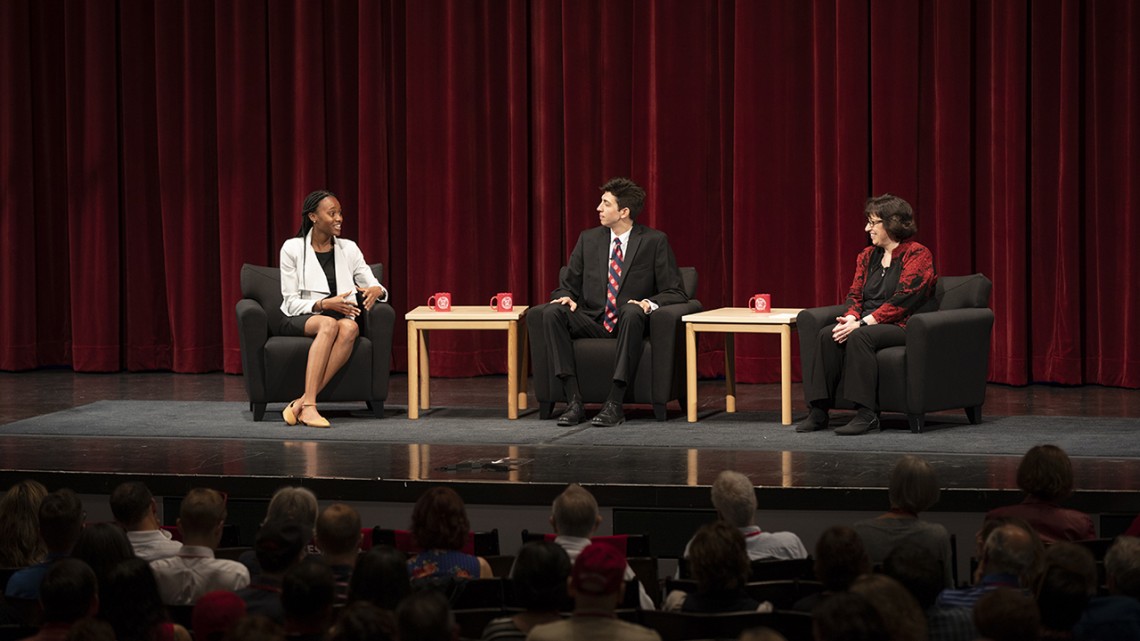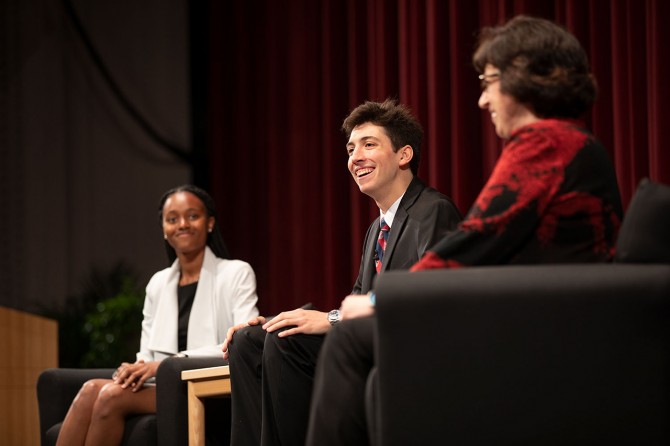
Maiquela Richards '18, left, answers a question posed to her by President Martha E. Pollack, right, during a Reunion Weekend presentation June 9 in Bailey Hall. In the center is Troy Anderson '19.
Young Cornellians shed light on the student experience at Reunion
By Tom Fleischman
Cornell President Martha E. Pollack gave alumni returning for Reunion 2018 a break the morning of June 9 in Bailey Hall.
She explained that while in past years the president would address alums on the state of the university, this year she decided to spare attendees yet another hour of lecture.
“By my count, each of you when you were at Cornell completed at least 2,160 hours of lectures, and a few more if you went on to graduate school,” she said to laughter.
Instead, Cornell’s 14th president took the opportunity to engage two young Cornellians – one a brand-new alum, one a rising senior – in a question-and-answer session in which Pollack got to ask most of the questions. The talk drew more than 1,000 alumni, faculty and others.
Linda Gadsby ’88, vice president and deputy general counsel of Scholastic, served as emcee. She recognized attendees President Emeritus Frank H.T. Rhodes and his wife, Rosa, who received an extended standing ovation.
Pollack, after brief opening remarks, talked with Maiquela Richards ’18, who graduated May 27 with a degree in government, and Troy Anderson ’19, a biological sciences major, in a relaxed conversation.
Pollack introduced Richards and Anderson as “true experts of the undergraduate experience at Cornell,” and began by asking them about their most interesting and challenging educational experiences. True to Cornell’s reputation for liberal arts excellence, both students said classes outside of their majors were among their highlights.
“My most interesting educational experience was actually a class called Chimpanzee Politics,” Richards said, drawing laughter from the audience, to which she replied, “Exactly.”
The course explores the social structure of chimpanzee colonies in the wild, Richards said, and it opened up a totally different educational avenue for her.
Anderson, a saxophone player with the Original Cornell Syncopators jazz troupe, was especially thrilled to spend time this past spring with Wynton Marsalis, during the jazz legend’s first visit to campus as an Andrew Dickson White Professor at Large.
“It was just such an incredible experience to get a chance to spend a week with someone who so few students get a chance to learn from,” Anderson said, the wonder of it still in his voice.
Pollack noted the “any study” aspect of their respective experiences: “Here we have Maiquela, a government major, talking about a science class, and Troy, a biology major, talking about music. To me, that’s Cornell.”
Regarding their most challenging academic experiences, Richards and Anderson said it was realizing, after they’d been at Cornell for a while, that their academic paths were going to need to change. For Richards, it happened in the spring of her sophomore year; the path she seemed so sure of was just not making her happy, and taking Intro to International Relations changed her trajectory.
“If I hadn’t been willing to make that change, and seek out people who could help me and give me a plan … it wouldn’t have been as great an experience at this university for me,” she said.
Anderson had a similar experience, switching from a pre-med to a doctoral track after being exposed to research as an undergrad. “My most difficult experience was coming to terms with the fact that something I might have been set on my whole life I wasn’t interested in anymore, because Cornell gave me the opportunity to explore.”
When asked how being in Ithaca – renowned for its gorges and for being “centrally isolated” – impacted their Cornell experience, both students saw it as a positive. “I would have to say that my legs are a lot stronger,” Anderson quipped, to knowing applause.
Anderson grew up in the Rochester, New York, area and could get home easily and have his family visit him and take in the natural and cultural offerings Ithaca has to offer. Richards grew up in Brooklyn and on Long Island, and appreciates the slower pace of upstate.
“I’d never really been into the outdoors – it never worked for me,” she said, smiling. “But now, I find that when I need to relax, I go for walks around Beebe Lake. And I’m finding ways to enjoy my friends’ company in ways I never had before.
“Being in a location that’s a little more secluded,” she said, “helps us kind of look inward and find out what really makes us happy when you don’t have things all around you [in the city] all the time.”
Pollack brought up “educational verve”: using modern approaches to teaching such as “flipped classrooms” with more student engagement and outside reading and less time in lectures. Both students said they’d had those kinds of experiences and saw great benefit in them.
Asked what advice they would give to incoming freshmen, both said to be open to new things and educational exploration.
“Recognize that you haven’t figured it all out yet,” Richards said. “ … Being OK with uncertainty is something that I think is really hard for our generation. People feel the need to commit to things very quickly so they can say they have something to do. … You should recognize that there are different pathways to the same outcomes, and that you should give yourself the opportunity to grow.”
“I think it’s important to recognize your limits,” added Anderson, a student adviser in the Office of Undergraduate Biology who will advise freshmen. “You need to make sure you don’t overload on courses and focus on the ones you have.
“Another thing I tell all my students is, make sure you’re taking courses that are completely outside your major,” he said. “Cornell is such a large university, and everyone is interested in something completely different. Because of that, we have faculty that teach pretty much anything imaginable.”
Media Contact
Get Cornell news delivered right to your inbox.
Subscribe

